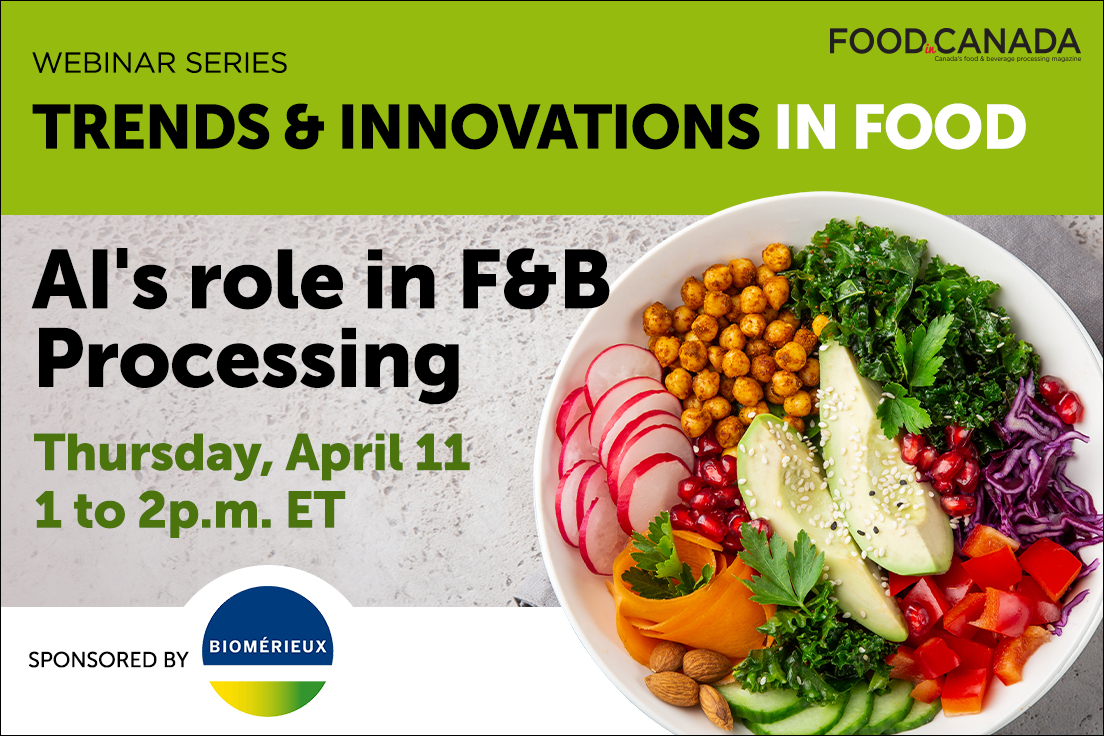
In recent years, the food and beverage industry has witnessed a significant transformation driven by advancements in artificial intelligence (AI) technologies. From streamlining operations to enhancing consumer experiences, AI is reshaping every aspect of F&B manufacturing.
A recent webinar organized by Food in Canada brought together industry leaders from Unilever, the Canadian Food Innovation Network (CFIN), and 6Seeds to delve into the multifaceted applications of AI in the F&B sector.
Speakers
Led by Gary Bogdani from Unilever, Nestor Gomez of CFIN, and Andreas Düss of 6Seeds, the webinar, moderated by Food in Canada’s editor, Nithya Caleb, offered valuable insights into the role of AI in F&B manufacturing.
Gary Bogdani, Head of Horizon3 AI Innovation Labs, Unilever

With a degree in engineering, Gary Bogdani is a data and advanced analytics leader with more than 25 years of experience in technology and business. As a strategic and thought leader, he has helped create a strong vision for transformation through analytics for Unilever in North America, leading a multi-year strategy and roadmap to further advance the use of AI in business decision making. Gary leads the global AI innovation CoE (Horizon3 Labs) established in Toronto in November 2023. The only global AI innovation centre for Unilever, Horizon3 Labs is focused on accelerating the generation of new AI concepts, designs, and projects that can be scaled and shared across the business globally. Gary strongly supports research and innovation as well as investment in developing AI/Data Science talent, firmly believing in the evolving role of technology in the workplace and its importance in digital transformation.
Nestor Gomez, Chief Technology Officer, Canadian Food Innovation Network


Andreas is a co-founder and COO of 6 Seeds, a consultancy firm specializing in F&B. He started his career working with some of U.K.’s top ad agencies as a creative director and brand strategist, working with technology giants like Canon, Cisco, Sony, and Google. After he moved to Canada, he co-founded Nourish Food Marketing in 2012. In 2022, he embarked on a new venture. With a vision to marry 30 billion food data points with the latest in AI technology, Andreas, along with Google alumni Kate Burns, established 6 Seeds, which seeks to empower clients worldwide with data- and technology-driven innovation and growth.
Webinar Summary
Unilever, a global leader in consumer goods, has been leveraging AI extensively across its operations. Bogdani shed light on Unilever’s use of AI in diverse areas such as product development, marketing, sustainability, and supply chain management.
“We’ve used AI to create new flavours of ice cream, optimize the design of the packaging of our products, as a marketing space to personalize ad recommendations, automate chatbots or voice assistance and reduce greenhouse gas emissions in sustainable material sourcing,” he said.
With over 400 AI-driven products in production, Unilever is at the forefront of AI adoption in the industry. The company has also established its global AI lab in Toronto based on the city’s reputation as an AI hub with easy access to collaborative ecosystems, and strategic positioning in data science.
Gomez emphasized how AI can enhance efficiency and reduce waste in F&B processing. Drawing on examples from innovative companies, he highlighted AI’s role in production forecasting, inventory management, and real-time monitoring of temperature changes in manufacturing facilities and transportation.
“AI can help retailers and foodservice operators plan their inventory and reduce spoilage. AI can be used to train machine learning or AI models to use temperature, humidity, and time and predict the shelf life of perishable goods. That helps businesses make better decisions about inventory rotation and discounting products that are nearing their end of life to avoid waste,” he said.
He further added that by harnessing AI technologies like machine learning and computer vision, businesses can optimize operations, minimize waste, and ensure product quality and safety.
Düss elaborated on how AI can revolutionize consumer approaches in the F&B industry.
Using the example of Odd Bunch, a subscription service offering imperfect produce, he illustrated how AI can dynamically match supply with demand, reducing food waste while offering personalized solutions to consumers.
“[The company offers] a meal plan specifically designed through what the supply chain has available at that moment in time. And that is just one example of how you can react in real-time to the availability of food that would otherwise go to waste,” he said.
By leveraging AI-driven insights, companies can optimize resource utilization, adapt to market fluctuations, and enhance customer satisfaction, he summarized.
Exploring AI applications
Supply chain management emerged as a pivotal area where AI is driving transformative change.
Bogdani highlighted Unilever’s AI-powered forecasting algorithms, which analyze historical data and market trends to generate accurate predictions.
“What we built is a series of AI algorithms that can analyze historical data, market trends like consumer preferences and other factors that allow us to generate an accurate forecast and prediction,” he said.
These forecasts enable Unilever to optimize inventory levels, reduce overstocking, and enhance service levels.
Gomez further emphasized AI’s role in creating transparent and sustainable supply chains, citing examples of companies leveraging AI and blockchain to trace product provenance and ensure quality and safety.
The discussion also delved into how AI is revolutionizing product development and marketing strategies. Bogdani underscored AI’s ability to analyze real-time consumer behaviour, enabling businesses to develop products aligned with market preferences and regulatory requirements.
Additionally, Düss highlighted AI’s role in personalized marketing and efficiency analysis, enabling businesses to optimize advertising strategies and enhance consumer engagement.
The human-AI collaboration
What’s noteworthy is that throughout the webinar, the panelists emphasized that AI is an enabler, not a replacement, for human expertise. By leveraging AI technologies, businesses can augment human capabilities, accelerate innovation, and drive sustainable growth in the F&B industry.
Challenges and opportunities
In the manufacturing sector, AI is a tool for streamlining operations and driving efficiency. Panelists emphasized the need for companies to adapt to AI technologies, citing its potential to create new jobs while transforming existing ones.
While saying this, the speakers acknowledged challenges in AI integration, including ethics, privacy, and regulatory compliance.
Bogdani emphasized Unilever’s commitment to addressing these concerns by prioritizing privacy and security, adhering to regulations, and implementing transparent processes.
He highlighted the importance of accountability and human oversight in AI-driven decision-making processes.
Gomez echoed Bogdani’s sentiments, emphasizing the need for clear objectives and guidelines when implementing AI solutions.
He advised companies, especially SMEs with limited resources, to identify specific business problems and prioritize investments based on potential return on investment (ROI).
He further stressed the importance of leveraging readily available AI tools, partnering with industry experts, and investing in employee skill development to maximize the benefits of AI adoption.
The panel also addressed regulatory challenges associated with AI integration in product development and labelling.
As the discussion progressed, the panelists shared their visions for an AI-empowered future in the F&B manufacturing sector.
Bogdani highlighted the potential for personalized consumer experiences and enhanced operational efficiency through AI adoption.
Gomez emphasized AI’s role in driving economic development, boosting productivity, and reducing food waste.
Düss underscored the importance of levelling the playing field for smaller companies by enabling access to AI tools and fostering innovation.
In conclusion, the webinar provides valuable insights into how AI is reshaping the F&B industry. As businesses continue to harness the power of AI, the potential for innovation and transformation in the F&B sector remains limitless.
This webinar series on “Trends and Innovations in Food” is sponsored by BioMérieux. Click here to watch the first webinar on “The Ozempic Effect.”
The next webinar is on “The Next Wave of Food Packaging: Are You Ready?” This will be on Thursday, May 2, 1-2 pm ET. Registrations are ongoing. For more information and to register, click here.
Watch Webinar NowPrint this page
